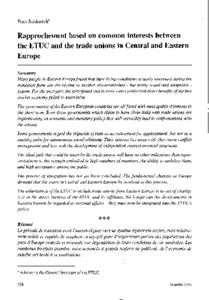Rapprochement based on common interests between the ETUC and the trade unions in Central and Eastern Europe

Transfer. European Review of Labour and Research
1995
3
July
378-386
ETUC ; labour relations ; trade union ; tripartism
Trade unionism
English
"Many people in Eastern Europe found that their living conditions actually worsened during the transition from one old régime to another old-established - but pretty sound and adaptable- system. For the most part, the anticipated and in some cases publicised direct benefits of the free market economy failed to materialise.
The governments of the Eastern European countries are all faced with inescapable dilemmas in the short term. Even those governments which claim to have close links with trade unions are implementing an economic and monetary policy that will inevitably lead to confrontations with the unions.
Some governments regard the tripartite system as an instrument for appeasement, but not as a starting point for autonomous social relations. Their interest lies more with short-term conflict management and less with the development of independent interest-oriented structures.
The ideal path that could be taken by the trade unions will have no other milestones than representativeness, the strength embodied in high numbers of members, the ability to mobilise them, and high acceptance among the public.
The process of integration has not yet been concluded. The fundamental changes in Europe demand that the states in Central and Eastern Europe be involved in this process.
The enlargement of the ETUC to include trade unions from Eastern Europe is no act of charity; it is in the direct interests of the ETUC and its affiliates. No longer can the developments in Eastern Europe be regarded as external affairs - they must now be integrated into the ETUC's policy."
Digital;Paper
The ETUI is co-funded by the European Union. Views and opinions expressed are however those of the author(s) only and do not necessarily reflect those of the European Union or the ETUI.